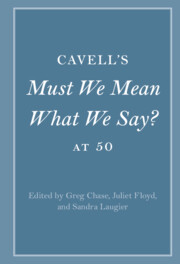Book contents
- Cavell’s Must We Mean What We Say? at 50
- Cambridge Philosophical Anniversaries
- Cavell’s Must We Mean What We Say? at 50
- Copyright page
- Contents
- Contributors
- Acknowledgments
- Abbreviations for Cavell’s Works
- Introduction
- Part I Ordinary Language and Its Philosophy
- 1 Must We Mean What We Say? and Ordinary Language Philosophy
- 2 Revolutionary Uses of Wittgenstein in Must We Mean What We Say?
- 3 Actions and Their Elaboration
- 4 Faces of the Ordinary
- Part II Aesthetics and the Modern
- Part III Tragedy and the Self
- Bibliography
- Index of Names and Subjects
- Index of References to Cavell’s Works
1 - Must We Mean What We Say? and Ordinary Language Philosophy
from Part I - Ordinary Language and Its Philosophy
Published online by Cambridge University Press: 03 March 2022
- Cavell’s Must We Mean What We Say? at 50
- Cambridge Philosophical Anniversaries
- Cavell’s Must We Mean What We Say? at 50
- Copyright page
- Contents
- Contributors
- Acknowledgments
- Abbreviations for Cavell’s Works
- Introduction
- Part I Ordinary Language and Its Philosophy
- 1 Must We Mean What We Say? and Ordinary Language Philosophy
- 2 Revolutionary Uses of Wittgenstein in Must We Mean What We Say?
- 3 Actions and Their Elaboration
- 4 Faces of the Ordinary
- Part II Aesthetics and the Modern
- Part III Tragedy and the Self
- Bibliography
- Index of Names and Subjects
- Index of References to Cavell’s Works
Summary
Must We Mean What We Say? is the first and only work in contemporary thought to carry the project of ordinary language philosophy through to its end. It thereby confronts and overcomes the harsh criticisms of ordinary language philosophy that began with Gellner’s attack in 1959, belying repeated claims that the tradition is “dead.” MWM shows that ordinary language philosophy is more than ever alive and relevant. Cavell’s emphasis on the “voice of the ordinary” responds to the risk of skepticism, that loss of or distancing from the world that film also explores (see The World Viewed). In Must We Mean What We Say?, Cavell offers us new ways to explore the relation between an individual speaker and her community, the possibility of revolution in philosophy, and the sense in which our relation to our own words figures our relations to ourselves: the question of self-knowledge and voice.
- Type
- Chapter
- Information
- Cavell's Must We Mean What We Say? at 50 , pp. 15 - 33Publisher: Cambridge University PressPrint publication year: 2022

